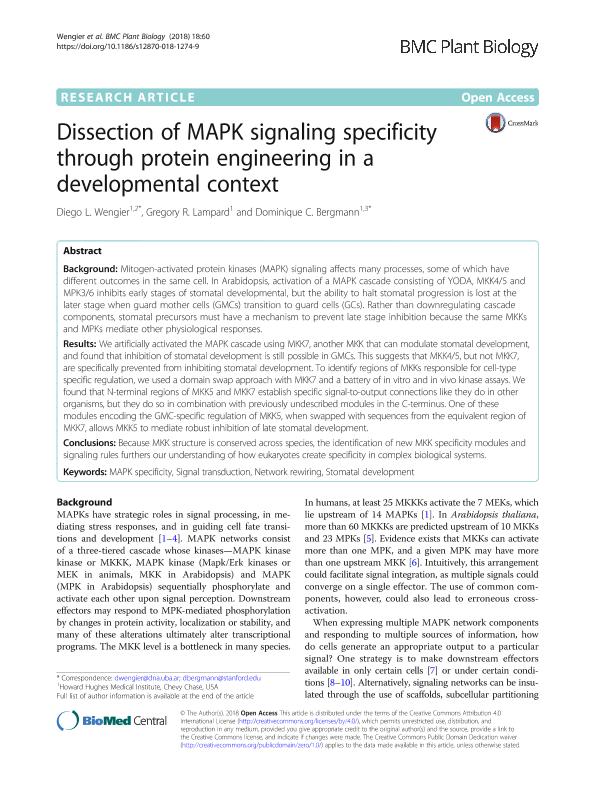Mostrar el registro sencillo del ítem
dc.contributor.author
Wengier, Diego Leonardo

dc.contributor.author
Lampard, Gregory R.
dc.contributor.author
Bergmann, Dominique C.
dc.date.available
2019-07-18T20:27:03Z
dc.date.issued
2018-04
dc.identifier.citation
Wengier, Diego Leonardo; Lampard, Gregory R.; Bergmann, Dominique C.; Dissection of MAPK signaling specificity through protein engineering in a developmental context; BioMed Central; BMC Plant Biology; 18; 1; 4-2018; 1-17
dc.identifier.issn
1471-2229
dc.identifier.uri
http://hdl.handle.net/11336/79851
dc.description.abstract
Background: Mitogen-activated protein kinases (MAPK) signaling affects many processes, some of which have different outcomes in the same cell. In Arabidopsis, activation of a MAPK cascade consisting of YODA, MKK4/5 and MPK3/6 inhibits early stages of stomatal developmental, but the ability to halt stomatal progression is lost at the later stage when guard mother cells (GMCs) transition to guard cells (GCs). Rather than downregulating cascade components, stomatal precursors must have a mechanism to prevent late stage inhibition because the same MKKs and MPKs mediate other physiological responses. Results: We artificially activated the MAPK cascade using MKK7, another MKK that can modulate stomatal development, and found that inhibition of stomatal development is still possible in GMCs. This suggests that MKK4/5, but not MKK7, are specifically prevented from inhibiting stomatal development. To identify regions of MKKs responsible for cell-type specific regulation, we used a domain swap approach with MKK7 and a battery of in vitro and in vivo kinase assays. We found that N-terminal regions of MKK5 and MKK7 establish specific signal-to-output connections like they do in other organisms, but they do so in combination with previously undescribed modules in the C-terminus. One of these modules encoding the GMC-specific regulation of MKK5, when swapped with sequences from the equivalent region of MKK7, allows MKK5 to mediate robust inhibition of late stomatal development. Conclusions: Because MKK structure is conserved across species, the identification of new MKK specificity modules and signaling rules furthers our understanding of how eukaryotes create specificity in complex biological systems.
dc.format
application/pdf
dc.language.iso
eng
dc.publisher
BioMed Central

dc.rights
info:eu-repo/semantics/openAccess
dc.rights.uri
https://creativecommons.org/licenses/by-nc-sa/2.5/ar/
dc.subject
Mapk Specificity
dc.subject
Network Rewiring
dc.subject
Signal Transduction
dc.subject
Stomatal Development
dc.subject.classification
Ciencias de las Plantas, Botánica

dc.subject.classification
Ciencias Biológicas

dc.subject.classification
CIENCIAS NATURALES Y EXACTAS

dc.title
Dissection of MAPK signaling specificity through protein engineering in a developmental context
dc.type
info:eu-repo/semantics/article
dc.type
info:ar-repo/semantics/artículo
dc.type
info:eu-repo/semantics/publishedVersion
dc.date.updated
2019-07-17T13:13:15Z
dc.journal.volume
18
dc.journal.number
1
dc.journal.pagination
1-17
dc.journal.pais
Reino Unido

dc.journal.ciudad
Londres
dc.description.fil
Fil: Wengier, Diego Leonardo. Consejo Nacional de Investigaciones Científicas y Técnicas. Instituto de Investigaciones en Ingeniería Genética y Biología Molecular "Dr. Héctor N. Torres"; Argentina. Howard Hughes Medical Institute; Estados Unidos
dc.description.fil
Fil: Lampard, Gregory R.. Howard Hughes Medical Institute; Estados Unidos
dc.description.fil
Fil: Bergmann, Dominique C.. Howard Hughes Medical Institute; Estados Unidos. Stanford University; Estados Unidos
dc.journal.title
BMC Plant Biology

dc.relation.alternativeid
info:eu-repo/semantics/altIdentifier/doi/https://dx.doi.org/10.1186/s12870-018-1274-9
dc.relation.alternativeid
info:eu-repo/semantics/altIdentifier/url/https://bmcplantbiol.biomedcentral.com/articles/10.1186/s12870-018-1274-9
Archivos asociados
